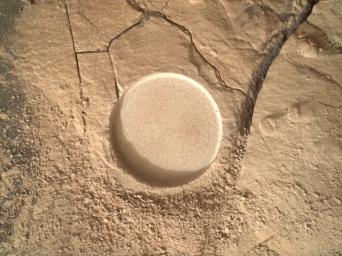Click here for animation
This video from NASA's Perseverance rover shows increasingly close views of an abraded rock at "Wildcat Ridge" in Mars' Jezero Crater, an area scientists consider one of the best places to search for signs of ancient microbial life. The images were taken by the cameras on the SHERLOC (Scanning Habitable Environments with Raman and Luminescence for Organics and Minerals) instrument at the end of Perseverance's robotic arm.
The clip is a collection of six images taken on July 21 and 22, 2022, the 504th and 505th Martian day, or sol, of the mission.
The first five images were taken by the Wide Angle Topographic Sensor for Operations and eNgineering (WATSON) camera. The final image, which is colorized, was created by combining images from WATSON and the Autofocus and Context Imager (ACI) camera.
The team uses the SHERLOC instrument to see how light interacts with the rock surface, revealing different components in the rock, including chemicals, minerals, and organic matter. By putting together the image and spectral information the instrument collects, SHERLOC can help scientists understand where organics and minerals are in the rock, and select samples for return to Earth.
The verification of ancient life on Mars carries an enormous burden of proof.
A key objective for Perseverance's mission on Mars is astrobiology, including the search for signs of ancient microbial life. The rover will characterize the planet's geology and past climate, pave the way for human exploration of the Red Planet, and be the first mission to collect and cache Martian rock and regolith (broken rock and dust).
Subsequent NASA missions, in cooperation with ESA (European Space Agency), would send spacecraft to Mars to collect these sealed samples from the surface and return them to Earth for in-depth analysis.
The Mars 2020 Perseverance mission is part of NASA's Moon to Mars exploration approach, which includes Artemis missions to the Moon that will help prepare for human exploration of the Red Planet.
NASA's Jet Propulsion Laboratory, which is managed for the agency by Caltech in Pasadena, California, built and manages operations of the Perseverance rover. WATSON and ACI were built by Malin Space Science Systems (MSSS) in San Diego and are operated jointly by MSSS and JPL.
For more about Perseverance: mars.nasa.gov/mars2020/
For more about the Mars Sample Return campaign: mars.nasa.gov/msr

 Planetary Data System
Planetary Data System












